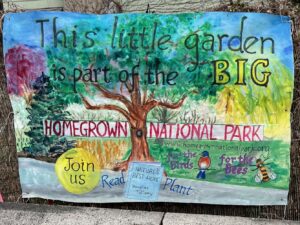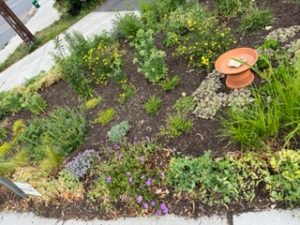
Friends of Bees and Watertown Community Gardens are holding the 27th Life-Friendly Garden Tour on Sunday, September 8 from noon to 3 pm. A social hour will follow at Watertown Free Public Library from 3:30 pm to 4:30 pm. We will explore how our gardens are part of Homegrown National Park.
Homegrown National Park is a challenge raised by University of Delaware professor and best-selling author Doug Tallamy. If we replaced half of what is now lawn nationwide, that could restore roughly 20 million acres — an area larger than any single National Park — to diverse ecosystems. For an introduction, it’s hard to beat watching Dr. Tallamy give his talk. You can view a recording of him and learn more here.
Our own Garden Tour is all about using no chemical insecticides, fertilizers, or herbicides, which lays the foundation for a vital ecosystem. The next step is to restore the native plants that our native bees, butterflies, moths, and birds coevolved with. The most important plants are the 14% of plant species that support 90% of the food chain: keystone native plants. It’s also important to remove invasive plants with origins in other regions of the world. Since the animals that eat them are not here, these non-native plants run rampant and fill space. If you would like to help remove invasive plants from our green spaces, check the Events page on Watertown Community Gardens for the next opportunity.
Instead, if you have space to plant a new tree, an oak will support by far the widest variety of caterpillars. Caterpillars are what most birds feed their young, the majority being moth caterpillars. Since moths need dark nights, you can help them by turning off artificial lights at night or using motion detecting lights. The leaves that fall under trees, if left in place, provide safe places for overwintering moths, butterflies, ladybugs, and other beneficial insects. You can increase overwintering habitat by adding “soft landing” plants, such as ferns and grasses.
If everyone did just one of these things, whether or not we have a garden, we can all contribute:
- Make our gardens safe for insects, birds, and all living beings by not using chemical pesticides, fertilizers, or herbicides.
- Reduce lawn.
- Remove invasive plants.
- Plant keystone native plants.
- Leave the leaves.
- Add “soft landings” under trees.
- Reduce artificial lighting at night.
- Get on the Homegrown National Park map!
And here is the map for Fall 2024 Garden Tour!
A printable version of the map is available as a brochure here. Please refer to the online map for full descriptions of the gardens.
The green flowers indicate hosted gardens. Hosted gardens will be welcoming guests during the hours of the Garden Tour. Until the next tour, please be respectful and view these gardens from the street.
The golden flowers indicate unattended planting strips and public gardens. These are open for viewing from the street any time!
For more information and the latest updates, you can join our mailing list by emailing us here.
For our first Summer Garden Tour, we explored the Mayor’s Monarch Pledge.
The 26th Life-Friendly Garden Tour was our first Summer Garden Tour! We celebrated the Monarch butterfly. You can learn more about how you can help the Monarch Butterfly and support the Mayor’s Monarch Pledge here.

For the Life-Friendly Garden Tour, anyone in Watertown who has not used chemical pesticides, herbicides, or fertilizers for at least a year is invited to participate as a host. This could be your full garden, your front yard, or just your planting strip. (Both Watertown Community Gardens and the Department of Public Works have excellent resources for your planting strip available here (WCG) and here (DPW). ) If you will be available during the hours of the Garden Tour to answer questions and share ideas, you will receive a sidewalk flag or yard sign to help guests find you. If you won’t be available that day, you can still have your planting strip included in the Garden Tour, which guests can view from the street.
Since this is an outdoor event, we are not requiring anyone to wear a mask. We do recommend that you be fully vaccinated and boosted against COVID-19.
If you like to be added to the Garden Tour mailing list, send us an email here.
You may join our discussion group on Facebook here.
About the Garden Tour
The Life-Friendly Garden Tour was founded by Henrietta Light to educate about gardening without chemical inputs. Exposure to chemical fertilizers and pesticides can sicken people and cause long-term health issues. The impact of chemicals is even worse in the garden. Most insecticides kill insects, whether they are pests, pollinators, or beneficial insects. Herbicides also kill a broad range of plants, including host plants for butterflies and moths, such as the milkweeds that Monarch butterflies depend on. Chemical fertilizers damage the balance of organisms that create a healthy soil. Through the Garden Tour and other events, we demonstrate that no chemicals are needed to create vibrant, healthy yards.
The first Chemical-Free Garden Tour took place in 2007. Since eliminating chemicals is rewarded by an increase in living beings, the name was changed to the Life-Friendly Garden Tour. It usually is held in on the second Sunday in September. This self-guided tour is free and open to the public.
